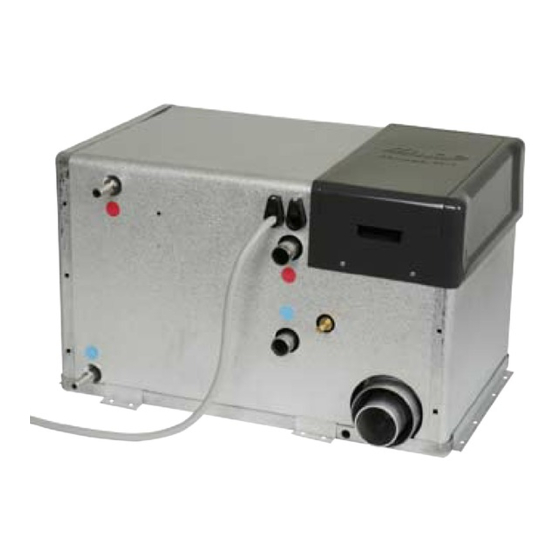Alde Compact 3010 Посібник з експлуатації - Сторінка 8
Переглянути онлайн або завантажити pdf Посібник з експлуатації для Система опалення Alde Compact 3010. Alde Compact 3010 12 сторінок.
Також для Alde Compact 3010: Короткий посібник (6 сторінок), Посібник із швидкого старту (4 сторінок)

:0
FAULT MESSAGES IN THE PANEL
NB! Fault messages are only shown when the panel is idle
GAS OUT is reset by the main breaker being switched off
and switched on again.
Otherwise, it is reset through the 1-volt main breaker
being switched off and then being switched on again.
GAS OUT
Caused by:
The heater has attempted to light the boiler repeatedly, without
the electronics receiving the signal from the sensor that moni-
tors the flame.
Probable reasons for the fault:
• No gas supply or insufficient gas supply in the vehicle.
• The electronics do not send a signal to the gas valve.
• The gas valve does not open.
• Impurities in the heater's gas pipes or nozzle.
• No spark from the electronics.
• The spark electrode has been damaged or is incorrectly
mounted.
• The sensor circuit in the electronics is not working.
• The sensor has been damaged or is incorrectly mounted.
• The exhaust/intake hoses have been damaged or are incor-
rectly mounted.
• Insufficient battery voltage or contact fault in cable.
• Break/short circuit in sensor no. 2 (red cable).
OHEAT 1
Caused by:
The blue sensor on the boiler body has registered a tempera-
ture in excess of 100ºC, or break/short circuit.
Probable reasons for the fault:
• Air in the heating system.
• Insufficient circulation or pump not working.
• The sensor has been damaged.
• The electronics are not monitoring the temperature.
OHEAT
Caused by:
The red sensor on the boiler body has registered a tempera-
ture in excess of 100ºC, or break/short circuit.
Probable reasons for the fault:
• See OHEAT 1.
FA
Caused by:
The fan has incorrect speed or is not in contact with the elec-
tronics.
Probable reasons for the fault:
• Fault in the fan.
• Break in the wiring between fan and printed circuit board.
• Monitoring by the printed circuit board not working.
BATT LO
Caused by:
The vehicle's battery voltage is less than 10.5 volts.
Probable reasons for the fault:
• Battery is low.
• Faulty contact between cable and boiler.
• Heater taking abnormally high current.
• Fault in printed circuit board.
WINDO
Caused by:
Connection no. 4 in the panel's accessory block is broken.
When this is broken, the heater does not function with LPG.
Usually this function is used to break the LPG heat if a window
is opened that is mounted close to the wall flue. If the function
is not used, a loop shall be mounted on the panel.
Probable reasons for the fault:
• Break in connection between switch and panel.
• Window switch damaged or incorrectly mounted.
• The loop incorrectly mounted or not present.
SERIAL
Caused by:
Communication fault between boiler and panel.
Probable reasons for the fault:
• Break in the cable for data communication between heater
and panel.
• Ignition spark goes to earth and interrupts communication.
• Some other electrical apparatus is interrupting
communication.
OTHER FAULTS THAT ARE NOT INDICATED IN
THE PANEL.
The heater is completely inactive and the panel is
not lit up.
• One of the 12-volt fuses has blown.
• The safety fuse has blown.
No electrical power.
• The 230 volts is not connected, or a fuse has blown.
• One of the 230-volt relays is not working.
• Break/short circuit in sensor no. 2 (red cable)
No heating in the vehicle despite the fact that the panel is
correctly installed.
• One of the circulation pumps is not working.
• Air in the heating system.
Incorrect heat regulation.
• The panel or remote sensor is unsuitably located.
No warm water.
• Problem with hot water thermostat (grey cable).
• PE on the panel in position ON.
:0
SAFETY CHECKS
Safety checks shall be carried out after each service.
Check:
• That the intake/exhaust gas hoses and roof flue do not leak
and are not damaged.
• That the LPG connections do not leak. Check the system
for leaks.
• That the 230V ~ earth connection is connected.
• That the safety valve on the warm water heater has not
been displaced.
• That the heating system has been filled with glycol mixture
up to the mark on the expansion vessel.
9
